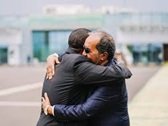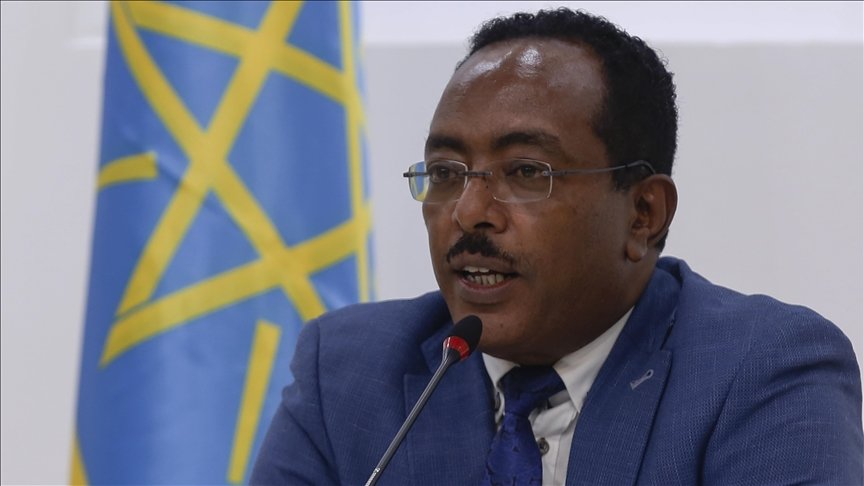By Khalid Hassan Yusuf
Arab historians who wrote about the history of the Horn of Africa region in the fifteenth and sixteenth centuries AD, spoke about the division of Muslims before the kings of Abyssinia. These Islamic-style emirates were subject to the control of the kings of Abyssinia, who were forcefully taking royalties from them.

However, Sultan Haq al-Din came and revolted against the reality of the Sultanate of Ifat’s submission to the Abyssinians. The Sultan Haq al-Din’s struggle attempt was met with the rejection of the notables of Ifat who refused to confront the Abyssinians, and decided to continue paying tribute to their opponents out of fear. Thus, aborting his attempt to obtain their freedom and assert their sovereignty over their lands.
Some of the rulers of the Emirate of Ifat, descended from the family of Omar and WelSama, became prisoners of the kings of Abyssinia, who controlled them politically. Moreover, the Abyssinians strategically managed their influence by keeping some rulers close as allies when it suited their interests, while imprisoning others as needed, only to release them at their discretion.
Somali politicians aligned with Ethiopia today bear a resemblance to the rulers of the Ifat Sultanate in their submission to the kings of Abyssinia. This dynamic is reflected in the historical account documented by the book Masterpiece of Time: The Conquests of Abyssinia by Shihab al-Din Abdul-Qadir Ahmad al-Jizani. In his discussion of the Sultanate of Adal (formerly Awdal), he describes the Sultanate of Hadiya, which comprised both Muslim and non-Muslim populations. The matter reached to a point that Sultanate Hadiya’s residents were compelled to present one of their most beautiful and high social status young women each year to the King of Abyssinia. This practice symbolized the complete subjugation of Hadiya’s people to their Ethiopian overlords. Ultimately, Imam Ahmed bin Ibrahim bin Osman rose to liberate them from this historical humiliation.
Historically, Abyssinia emerged as an expansionist state as early as the 4th century AD, when King Ezana adopted Christianity and expanded northward into Sudanese territories, overthrowing the Kingdom of Marwa. Over time, the Abyssinians extended their control eastward and southward, subjugating various groups, including the Oromo, Benishangul-Gumuz, Hadiya, Sidamo, Afar, Somalis, and others during different periods.

Later, Ethiopia’s alliance with European countries bore fruit, with it demanding its share of the African continent in 1884.
In 1963, it participated in dedicating the Organization of African Unity, which established the inviolability of the political borders left by colonialism between the countries it occupied, regardless of the desires of the peoples who fell into the grip of a new occupation that was no different from that of the European one, if not worse than it! This resulted in a state of conflict between African countries. These included the wars between Somalia and Ethiopia in 1963 and 1977, not to mention the ongoing conflict between the two countries until 1988, after their conflict was settled on the sidelines of the meetings to establish the IGAD organization in Djibouti in 1986.
The current Ethiopian aggression towards Somalia began after 1991 at various levels, and reached the point where it violated the UN resolution banning weapons from this collapsed country. Thus, Addis Ababa worked to control the Somali factions fighting among themselves, and granted each party weapons in particular.
On the other hand, managing the flow of water from the Shabelle and Juba Rivers into Somalia became a pressing concern after Ethiopia constructed dams to reserve this vital water resource. Despite the seriousness of the situation, it failed to trigger alarm among Somalis. Moreover, the Somali government neither issued political objections nor pursued diplomatic action to counter this measure, which adversely impacted Somalia’s access to water for its agricultural production, hydro-power and its regional influence.
Ethiopian violation led to Somalia falling increasingly under the influence of neighboring countries, particularly Ethiopia. This became evident during the presidencies of Abdullahi Yusuf Ahmed, Hassan Sheikh Mohamud (during his first term), and Mohamed Abdullahi Farmaajo. Ethiopia’s influence extended deeply within Somalia, to the extent that a portion of the Federal Presidency’s headquarters in Mogadishu was allocated for the Ethiopian embassy.
The current division within Somalia mirrors historical patterns reminiscent of the Islamic Emirates. Ethiopian influence over Somalia has been tacitly accepted by major powers, most notably the United States, under the pretext of combating terrorism. Washington has largely overlooked Ethiopia’s transgressions against Somalia, prioritizing its foreign policy objectives and focusing solely on countering Al-Shabab. Historically, the Abyssinians agreed to obtain an external outlet to the sea, whether in the Red Sea or the Indian Ocean, and for this reason Abyssinia worked in the past and in the present.
In this regard, their interest historically came on the cities of Zeila and Balad to reach the Red Sea and the Indian Ocean.
Despite the state of ethnic division that Ethiopia is witnessing, there is an implicit consensus among the vast majority of this country to obtain a sea port, despite their internal differences. While we find a state of division in Somali circles regarding confronting the Ethiopian position, and disagreement over political sovereignty, we find skepticism on the part of the cantons of Puntland, southwest of Somalia’s Juba, which represent political forces linked to Ethiopia, especially since there is a movement that finds, in light of the new reality, an interest in connection with Addis Ababa, is bigger than relations with Federal Government in Somalia!
Also, the priorities of Somalis at the present time have become different from this approach, Ethiopia has benefited greatly from the absence of national reconciliation and the continuation of tribal civil wars at the level of Somalia. The result is that all these issues established Ethiopian control over Somalia.
In this context, it can be said that even the priorities of Somali political Islam have become different, and they are regional and regional, as you will find them divided between the existing cantons in Somalia, and against the backdrop of the division between unity and secession, while they echo their concern for the message of Islam, and you find them more keen on solidarity with Palestine over their interest of Somali unity!

In turn, the reality of the division includes the educated Somali elite, which was supposed to be like a wall on whose sides it would break, the expansionist political discourse of the Ethiopian state, and the Somali racism associated with it. While the religious and national necessity requires that society be mobilized from a religious perspective consistent with its legitimate national and national dimensions.
The recent statements of the advisor to the Ethiopian Prime Minister, Redwan Hussein, are a clear acknowledgment of Ethiopia’s aggression towards Somalia, and the content of his speech confirmed that there are offers by six African countries to grant his country an economic maritime outlet.
However, he explicitly confirmed that Ethiopia is looking for something beyond that offer, which is to obtain a sea port subject to the sovereignty of its state, and that Addis Ababa will work to fulfill this political desire either through agreement or through forced military takeover of the sea port! He added that his country will not remain idle while there is a group of countries coming from across the seas, and across great distances from the region, and have dedicated military bases in Djibouti.
Also on October 15, 2023, in turn, Ethiopian Prime Minister Abiy Ahmed had declared, in the presence of the Ethiopian Parliament, his country’s desire to obtain a sea port, either by agreement or by trickery (what is meant here is force or imposition).
Addis Ababa is also betting on the state of political and security turmoil in the world, and on the focus of the forces of the international community, each of them, on the priority of its political interests, and betting on the precedent of Russia’s invasion of its neighbor, Ukraine. Taking advantage of the destabilization of the security situation in the Red Sea and the Gulf of Aden, where Ethiopia wants to exploit the security instability in those waters, while the Ethiopian encroachment is considered an additional factor threatening the security of those sea lanes and the Horn of Africa region.
As for Somalis, it is necessary to realize that their problem is not with specific Ethiopian governments or specific nationalities, but rather with the Ethiopian state system in general, regardless of its rulers and their ethnic backgrounds. In this regard, the Somali elements who hold official positions in this state should not be excluded, as they in turn are part of from the state machine Ethiopian expansionism, and in the end, they are an extension of the rulers of the Islamic-style emirates or some of the rulers of the Sultanate of Awdal or Adal, who usually favored submission to the kings of Abyssinia.
The irony is that, in light of the reality of deterioration between the two countries, the headquarters of the Ethiopian embassy is located in the heart of the headquarters of the Presidency of the Somali Republic in Mogadishu!
Khalid Hassan Yusuf
Email: khalidsf5@gmail.com
————–
Khalid is a Yemen-based journalist who contributes to various Arab publications. This article was originally written in Arabic and translated into English.

Leave a Reply